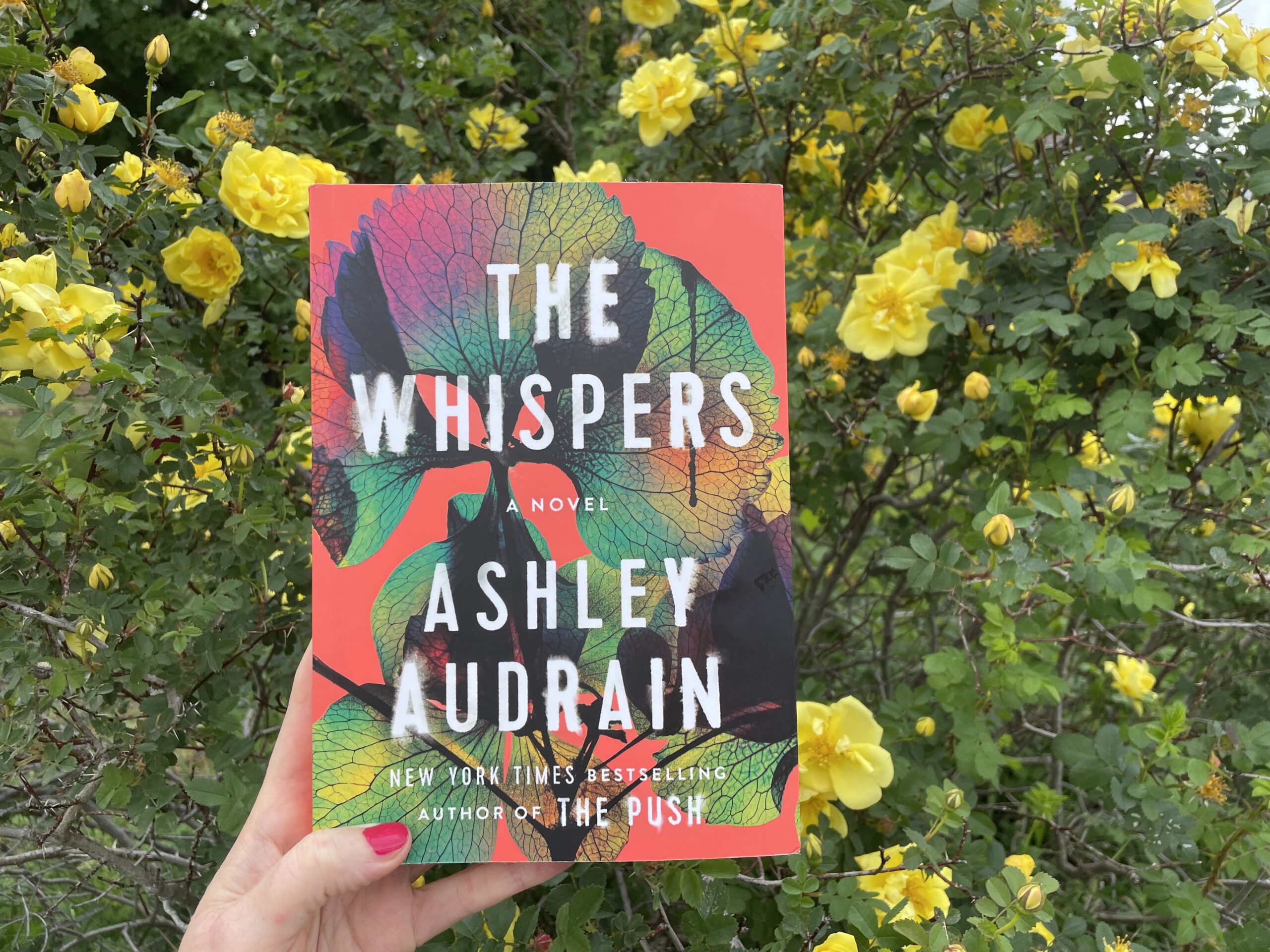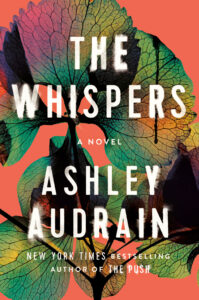Sponsored by Penguin Canada
Ashley Audrain isn’t afraid to dive into the darkness that lies beneath even the most polished of surfaces. The Canadian author’s latest novel, The Whispers, takes readers into the quiet streets and back gardens of suburbia, and confronts the rage that many women, especially mothers, have learned that they must contain at all costs. An instant #1 national bestseller, The Whispers has garnered tons of praise for its bold and gripping storytelling, as well as its nuanced and honest portrayal of motherhood.
“The Whispers is spellbinding, a shimmering, visceral ride through the dark side of family, of community, of womanhood and mothering,” writes Lisa Jewell, #1 New York Times bestselling author of The Family Remains. “Nobody delves as deep into the guts of motherhood as Ashley Audrain, she really is in a league of her own.”
The Whispers is an exhilarating story rife with suspense—a perfect page-turner to pick up this summer. We were eager to connect with Ashley to hear how she tackled the darker themes in her novel, and why we need to be talking about the parts of motherhood that aren’t picture-perfect.
When you set out to write The Whispers, what question or idea were you most curious to explore?
Well, I was certainly interested in how women are feeling in mid-life. It’s such an interesting decade, to be in your 40s—it’s the time of life when you’re actually living with all of the decisions you’ve made in your 20s and 30s. I think a lot of women face an emotional reckoning at this point—am I who I wanted to be at this point in my life? How did I get here? Is this what life was supposed to look like? And of course, the window for change and opportunity can feel like it’s quickly closing. I wanted to explore that stage through some of these women on Harlow Street. I also wanted to write about friendships at this stage in life, because it can be tricky and layered, especially when friends are mothers, too.
Motherhood is complex, and you dare to show the darker sides of it. What compels you to excavate these complex spaces that many would avoid out of fear?
It’s really interesting that we still attach so much fear and shame to the darker realities of motherhood—this is such a pervasive thing in our society, although I do think we’re sharing more now than ever (that said, we’re also comparing more now than ever, and perhaps that’s counterproductive). I find it so compelling to explore this territory through fiction, especially the psychology of it, because it’s a way to confront all of this darkness in a creative way, even though we’d never want to have these experiences in real life. It’s a way of cracking things open to push a little more, dig a little deeper, and see what truths we can find. So I suppose it comes from a curiosity, mostly.
Reading The Whispers, we can’t help but imagine you in playgrounds, at pick-up, or in the soccer field interacting with fellow parents, whilst constantly absorbing relationship dynamics, or bits of dialogue to later incorporate into your book. Do you have a favourite spot for inspiration? And why do you think it’s so juicy?
Ha! I’m sure I’m less popular at the playground now! I really don’t seek out inspiration from the people I know or interact with, or the places I go, but of course as writers, we’re always collecting thoughts and noticing behaviours, whether we’re conscious of this or not. I think if we’re just paying close attention to life—if we’re really listening to people, and closely observing strangers, and empathizing with others—then things like character development can come more naturally. I will say, I am a frequent note-taker. I use the Notes app on my iPhone a lot throughout my day to jot down things that come to me for whatever work-in-progress I have. But again, so much of our inspiration is subconscious, and who knows where it comes from exactly. Which feels like the magical part of writing!
Are you ever scared to tackle certain scenes? If so, what creative techniques help you push through?
No, I can’t say I ever feel scared to tackle a scene or a topic. There are some tough subjects in The Whispers, ones I’ve tried to be thoughtful and respectful about, but to be honest, those are the ones I’m most interested in writing. I’m often not quite sure how the tougher scenes will develop on the page or where something will go, and how far. But that’s part of what keeps the creative energy alive—I like to leave room to be surprised.
Since publishing The Push and The Whispers, what’s the feedback you receive most consistently from readers that resonates the most with you?
Perhaps the most meaningful feedback is that readers feel seen after reading one of my books. Of course, these characters and their scenarios are fiction, and fiction is meant to entertain—the women I write about are in extreme situations that none of us can relate to entirely. But hopefully, a reader can see themselves in a certain thought, or behaviour, or line of dialogue that makes them feel understood in a way they maybe didn’t before. One of my favourite emails is from a mom of a young patient at SickKids in Toronto, where my son is also a patient—she wasn’t a reader at all and never picked up books, but she found a copy of The Push while she was there and had a feeling she should read it. She couldn’t believe how much she related to the themes and character. Now, she reads a lot! And we stay in touch through email.
What does Ashley Audrain’s writing process look like? Can you paint a picture for us?
I wish it was more consistent and predictable! But it does seem to start with a lot of notes. For the current book I’m working on, I have about fifty pages of notes in a Word document that I’ve collected over the years. I organize those slightly, and then loosely decide on how a structure could look, and then start writing more or less chronologically, but it’s messy. I wish I was more of a plotter, one of those writers who has colour-coordinated sticky notes on the wall and knows exactly what comes next—but so far that hasn’t happened. I think I’ve learned not to put too much stock in how the first draft turns out, because now I know it changes enormously, and requires a lot of heavy revision to get better (at least for me). As for when and where, I mostly work at coffee shops or the library after I drop my kids off at school, until whenever I run out of steam. I’m also a big fan of trying to get away for a writing weekend, the rare time when life allows, to sink into something that feels stuck, or try solving a problem. The change of scenery and letting go of things at home helps me so much.
What writing advice has served you well? Perhaps something you’d like to pass along to the author currently struggling with their first book?
The writing advice I like best is to write like your parents are dead, which I should probably start rephrasing as: write like nobody will read it. The sentiment is the same—write the scene you really want to write, and don’t worry about what people will think of you for it. I’m convinced this is where the best and most interesting writing comes from, that total lack of inhibition or worry about judgement.
When it comes to motherhood, what conversations do we need to be having right now?
I think a lot of mothers are angrier on a daily basis than we’d like to admit. Especially post-pandemic. And culturally, we are so hard on angry women, so a lot of us don’t know what to do with it. In The Whispers, we see both Whitney and Blair struggle with maternal anger but express it in very different ways. There’s a brilliant book out recently, On Our Best Behavior: The Seven Deadly Sins and the Price Women Pay to Be Good by Elise Loehen that examines this as part of a larger conversation. She writes about how as girls, we’re conditioned from a very early age that anger is not appropriate, and so anger comes out in other ways—for a lot of moms, this becomes gossip and judgement about each other, so much so that it’s become a cultural norm. I think we should be talking more about this.





 Follow Us On Instagram
Follow Us On Instagram
